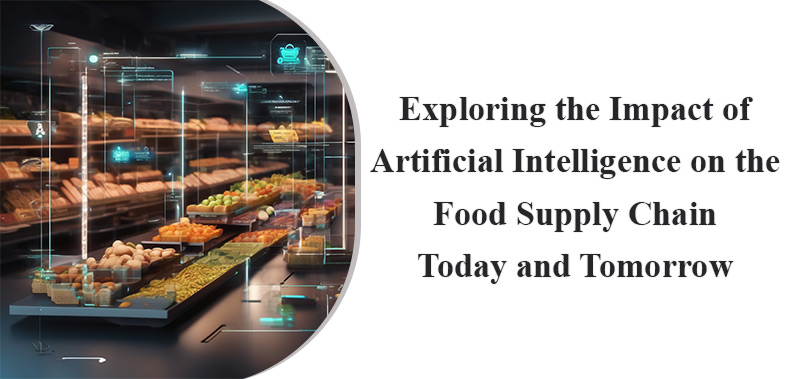
Exploring the Impact of Artificial Intelligence on the Food Supply Chain Today and Tomorrow
The food supply chain is a complex web of interconnected processes that begins with the production of raw materials and extends through processing, distribution, and retail to the consumer. It’s an intricate system, involving multiple stakeholders, and has become increasingly globalized in recent years. This complexity, coupled with the growing demand for efficiency and sustainability, has driven the adoption of advanced technologies. Artificial Intelligence (AI) is emerging as a transformative force in reshaping the food supply chain, offering significant potential to address the industry's biggest challenges today and tomorrow.
AI in the Food Supply Chain Today
Artificial Intelligence is already being integrated into various stages of the food supply chain, enhancing efficiency, reducing waste, improving safety, and ensuring sustainability. Let’s take a closer look at its current role in some key areas:
1. Precision Agriculture
At the very beginning of the food supply chain, AI is revolutionizing farming practices. Through the use of AI-powered tools like drones, sensors, and machine learning algorithms, farmers can now analyze soil quality, predict weather patterns, and optimize crop yields. Precision agriculture allows farmers to make data-driven decisions, ensuring they use resources such as water, fertilizers, and pesticides more effectively. This not only improves productivity but also reduces environmental impact.
For example, AI systems can predict pest outbreaks, allowing farmers to apply treatments only when necessary. AI-based imaging technology can monitor crop health, identifying diseases at an early stage to prevent large-scale losses. With these innovations, AI is helping farmers produce more food with fewer inputs, which is critical to feeding a growing global population.
2. Supply Chain Optimization
AI is playing a pivotal role in optimizing the logistics and distribution aspects of the food supply chain. Machine learning algorithms can analyze data to forecast demand with a high degree of accuracy. This helps food producers and retailers maintain optimal inventory levels, reducing both waste and shortages.
In the transportation sector, AI-driven systems can determine the most efficient delivery routes, minimizing fuel consumption and speeding up delivery times. Predictive analytics helps companies identify potential disruptions in the supply chain, such as extreme weather events or labor shortages, and allows them to take proactive measures.
3. Food Safety and Quality Control
Ensuring food safety is a top priority in the food industry, and AI is making significant strides in this area. AI-powered inspection systems can detect contamination, spoilage, or defects in food products with higher accuracy and speed than human inspectors. This technology is beneficial in meat processing plants, where AI can detect anomalies in meat products and ensure that they meet safety standards.
AI is also being used in the traceability of food products. Blockchain technology, combined with AI, allows for real-time tracking of food items from farm to table. This level of traceability is essential in quickly identifying and addressing foodborne illness outbreaks, thereby protecting public health.
The Future of AI in the Food Supply Chain
While AI’s impact on the food supply chain is already evident, the future holds even more significant potential for transformation. Here are some of the ways AI is expected to reshape the industry in the coming years:
1. Hyper-Personalized Nutrition
AI has the potential to create a more consumer-centric food supply chain. As personalized nutrition becomes a growing trend, AI will enable food companies to analyze individual dietary preferences and health data to offer tailored food products. Imagine a future where your grocery list is automatically generated based on your unique nutritional needs, and the food you buy is optimized for your health.
AI-powered apps are already beginning to recommend personalized meal plans based on users’ health data. In the future, AI could enable food producers to create hyper-personalized products that cater to specific dietary requirements, such as gluten-free, low-sodium, or vegan diets, all based on individual health profiles.
2. Sustainable Food Production
As climate change continues to impact global food production, AI will play a critical role in developing sustainable agricultural practices. AI systems will help farmers adapt to changing environmental conditions by optimizing resource usage and reducing the carbon footprint of farming. Vertical farming, where crops are grown indoors under controlled conditions, is another area where AI will be instrumental in improving efficiency and sustainability.
Additionally, AI can facilitate the development of alternative proteins, such as lab-grown meat and plant-based substitutes. By optimizing the production processes for these new food sources, AI can help reduce the environmental impact of traditional animal farming.
3. Advanced Food Packaging and Waste Reduction
AI will also drive innovations in food packaging, with the aim of reducing waste and enhancing sustainability. Innovative packaging that integrates AI could monitor the freshness of food products in real-time, alerting consumers when products are nearing expiration. This would help reduce food waste, which is a significant issue globally.
Moreover, AI-powered systems could optimize the use of biodegradable materials in packaging, reducing the environmental footprint of plastic waste in the food industry.
4. Autonomous Supply Chain Management
The integration of AI with the Internet of Things (IoT) will enable autonomous supply chain management. In the future, smart warehouses equipped with AI-powered robots will handle inventory management and order fulfillment. Autonomous vehicles and drones could be used for the delivery of food products, further increasing efficiency and reducing human labor.
AI will also enhance the transparency of the food supply chain by providing real-time data on every stage of production and distribution. This transparency will be critical in building consumer trust and ensuring that food companies meet regulatory requirements related to safety and sustainability.
Challenges and Considerations
While AI offers tremendous potential, its adoption in the food supply chain is not without challenges. One significant concern is the cost of implementing AI technologies, particularly for small-scale farmers and food producers. Access to high-quality data is another challenge, as many stakeholders in the food supply chain do not have the infrastructure in place to collect and analyze data effectively.
Additionally, there are ethical concerns related to AI in the Food supply chain, particularly regarding labor displacement. As AI takes on more tasks, there is a risk that jobs in agriculture, food processing, and distribution may be lost. It will be necessary for policymakers and industry leaders to address these concerns and ensure that workers are retrained for new roles in the AI-driven food economy.
Conclusion
Artificial Intelligence is already making significant strides in transforming the food supply chain from farm to fork. Today, AI is enhancing precision agriculture, optimizing logistics, improving food safety, and reducing waste. In the future, AI’s role will expand further, driving innovations in personalized nutrition, sustainable food production, packaging, and autonomous supply chain management.
However, the road ahead is not without challenges. Addressing the ethical, economic, and logistical issues associated with AI will be crucial to ensuring that its full potential is realized. As the world grapples with the dual challenges of feeding a growing population and mitigating climate change, AI holds the key to creating a more efficient, sustainable, and resilient food supply chain for the future.




